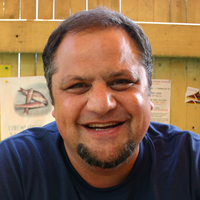Neurodiversity speaker series established at W&M
Update: The next two speakers in the series have been selected. John Elder Robison will discuss his latest book, Switched On, on March 28, 2016, at 7 p.m. in Tucker Theatre. John Donovan and Caren Zucker will discuss their book, In a Different Key, at 7 p.m. on April 17 in Tucker Theatre. Both events are free and open to the public. - Ed.
Journalist and author Steve Silberman will speak at William & Mary Nov. 8, kicking off the university’s new Olitsky Family Foundation Neurodiversity Speaker Series for 2015-16.
 The event, hosted by the W&M Neurodiversity Initiative, will be held at 7 p.m. in the Sadler Center’s Commonwealth Auditorium. It is free and open to the public.
The event, hosted by the W&M Neurodiversity Initiative, will be held at 7 p.m. in the Sadler Center’s Commonwealth Auditorium. It is free and open to the public.
The speaker series was established with an $80,000 commitment from Stephen and Tamar Olitsky, philanthropists based in Gwynedd Valley, Pennsylvania. The gift, the Olitskys’ first to W&M, will also support the university’s neurodiversity scholar-in-residence program.
"Since we launched the neurodiversity initiative in 2012, it's fantastic to see how it's been embraced here at William & Mary,” said Karin Wulf, professor of history, director of the Omohundro Institute and co-chair of the W&M Neurodiversity Working Group. “The Olitskys’ gift is a wonderful confirmation of the work we're doing on campus for neurodiversity and an opportunity to share that work even more broadly, both with our local community and with other colleges."
Silberman is the author of the New York Times bestseller NeuroTribes: The Legacy of Autism and the Future of Neurodiversity, which includes a foreword by the late neurologist and author Oliver Sacks. Silberman has written countless science articles for publications such as Wired, The New Yorker and Salon, and his work has been published in anthologies including The Best American Science Writing of the Year and The Best Business Stories of the Year. Silberman’s TED Talk on the forgotten history of autism, filmed in March 2015, has been viewed more than one million times.
 Silberman won the 2010 Science Journalism Award for Magazine Writing from the American Association for the Advancement of Science and the Kavli Foundation for his Wired article, “The Placebo Problem.” He also received a gold record from the Recording Industry Association of America for co-producing the Grateful Dead box set So Many Roads (1965-1995).
Silberman won the 2010 Science Journalism Award for Magazine Writing from the American Association for the Advancement of Science and the Kavli Foundation for his Wired article, “The Placebo Problem.” He also received a gold record from the Recording Industry Association of America for co-producing the Grateful Dead box set So Many Roads (1965-1995).
The W&M Neurodiversity Initiative aims to educate the campus community about brain differences as an aspect of diversity. The initiative includes a student group and a working group that have sponsored numerous events at the university, developed guidelines to help faculty work with neurodiverse students and created a course on neurodiversity, co-taught by scholar-in-residence John Elder Robison. Robison is one of the nation’s most well-known and influential neurodiversity advocates and has written multiple articles and best-selling books on the topic.
“We are very fortunate to have John Elder Robison as a key member of W&M’s neurodiversity initiative,” said Provost Michael R. Halleran. “His experience, expertise and passion are invaluable. Steve Silberman has written a stunning account of the history of autism, and we are thrilled that he will be visiting campus next month to stimulate our own work.”
Halleran and Robison are both expected to make introductory remarks at the Nov. 8 event, which will be the first of three in the 2015-16 series. Details on the other two events are still being finalized, but information will be posted to the W&M Neurodiversity Initiative webpage when available.
“To put it simply, I find Silberman's work to be a refreshingly optimistic indicator of neurodiversity's progress, and its far-reaching appeal gives me high hopes for the neurodiversity movement in future years,” said Joel Carver ’17, co-chair of the W&M Neurodiversity Student Group.













